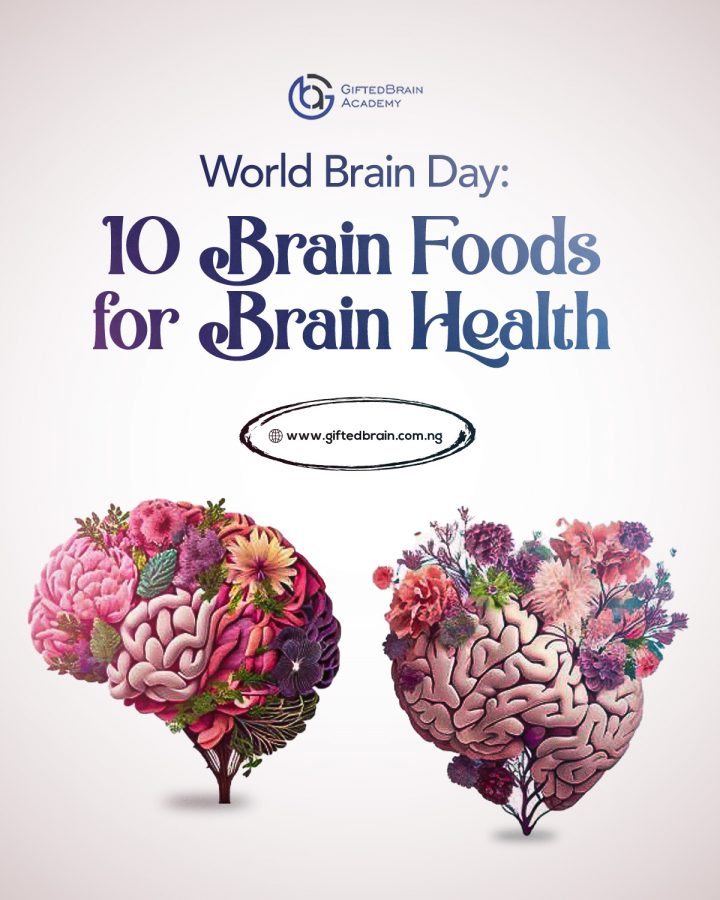Hey there, gifted brain! It’s World Brain Day, and we have a little favour for that awesome brain of yours! How about treating it with some brain-boosting magic? Trust us; it will thank you later. Now, here is the deal: we have the top 10 brain foods that will help you boost your brain health. They’ve got a secret potion that gives your brain a high-five! Not just their names, we will also let you know the secret behind their brain-boosting superpowers. Prepare to be amazed!
But, before we get into the actual brain foods, let us chat about their importance for brain health.
Why Brain Food?
Why are we having this conversation about brain food? Food is more important than you think.
I know you think you know that it’s important, but do you really know?
Dr. Eva Selhub, a resilience expert, explains how the kind of foods we eat affects our brain health. To illustrate, she compares the brain to a vehicle; when the brain is fuelled with quality food, it performs better just as a car performs well with natural fuel.
Here is the gist!
Our body uses up oxygen, and when it does, it produces free radicals which are wastes. These wastes are capable of damaging cells in the body. Now, eating brain foods that are rich in vitamins, minerals, and antioxidants is the way we protect our brains from these wastes.
Just as you wouldn’t put water into a car, you shouldn’t feed your brain with inferior fuel, because when you do, the brain can’t function at its best. An example of inferior fuel, in this case, would be excess refined sugar. The effects are numerous; it can lead to impaired brain function and inflammation, and even contribute to feelings of depression. So, the next time you reach for a Coke to cope with a tough day, think twice!
Likewise, Dr. Lisa Mosconi, a neuroscientist and integrative nutritionist, also explains how the brain has unique dietary needs compared to other organs. You could say that the brain is selective in its choice of nutrients. I daresay that it has a right to be.
The brain needs 45 different nutrients to operate at its best; and while some of these nutrients can be produced by the brain on its own, others are obtained from the food we eat.
I think you now have a better understanding of the importance of food to brain health and why it is especially important to nourish our brains on this special day.
Now, let’s get to the brain foods.
10 Brain Foods for Brain Health
1. Avocados

Science has shown that avocado is a source of healthful unsaturated fat which makes it great brain food.
This is because research has shown that unsaturated fat helps maintain healthy blood flow. It may also reduce blood pressure, which is a factor in cognitive decline.
Other sources of healthy unsaturated fats include almonds, flaxseed, soybean, sunflower, canola oils and fish. Get your hands on any of these and you are good to go!
2. Eggs
These are my favourites. Eggs are great brain food because they contain choline, as well as vitamins B6, B12, and folate.
Choline is an important micronutrient that the body uses to create acetylcholine, a neurotransmitter that helps regulate mood and memory.
Studies have shown that found that high intakes of choline are linked to better memory and mental function.
Nevertheless, many people do not get enough choline in their diet.
Eating eggs is an easy way to get choline, as egg yolks are among the most concentrated sources of this nutrient.
The B vitamins found in eggs also play several roles in brain health.
To start, they may help slow the progression of mental decline in older adults by lowering levels of homocysteine, an amino acid that could be linked to dementia and Alzheimer’s disease.
Also, being deficient in two types of B vitamins — folate and B12 — has been linked to depression.
Folate deficiency is common in older people with dementia, and studies show that folic acid supplements can help minimise age-related mental decline.
Vitamin B12 is also involved in the synthesization of brain chemicals and in the regulation of sugar levels in the brain.
Although there is very little direct research on the link between eating eggs and brain health, there is research to support the brain-boosting benefits of the specific nutrients found in eggs.
Why not grab an egg on your way home today?
3. Green leafy vegetables
If you’re like me and do not like vegetables, our opinion does not matter because its essence as a great brain food cannot be underemphasized.
Leafy vegetables such as kale, spinach, and collards are rich in brain-healthy nutrients like vitamin K, vitamin E, lutein, folate, and beta-carotene. Research suggests these plant-based foods may help slow cognitive decline and improve memory.
4. Turmeric

This deep-yellow spice is a key ingredient in curry powder and has a number of benefits for the brain.
Curcumin, the active ingredient in turmeric, has been shown to cross the blood-brain barrier, meaning it can directly enter the brain and benefit the cells there.
This is great because curcumin has been proven to improve memory, aid in the production of new cells, and ease depression by boosting mood hormones.
How about adding a spoonful of turmeric to your dish today?
5. Dark chocolate
Just before you skip this paragraph without reading the rest (just because you saw chocolate), allow me to state that the darker the chocolate, the better it is for your brain.
Dark chocolate and cocoa powder are packed with some brain-boosting compounds, including flavonoids, caffeine, and antioxidants.
Dark chocolate has a 70% or greater cocoa content. These benefits are not seen with regular milk chocolate, which contains between 10–50% cocoa.
Also, the flavonoids in chocolate gather in the areas of the brain that deal with learning and memory. Researchers believe that these compounds may improve memory and also help slow down age-related mental decline.
According to one study of over 900 people, those who ate chocolate more frequently performed better in a series of mental tasks, including some involving memory, compared with those who rarely ate it.
Chocolate is also a legitimate mood booster, according to research.
So next time you have a craving, why not go for a bar of dark chocolate?
6. Peanuts
Peanuts are a legume with an excellent nutritional profile. They contain many unsaturated fats and proteins to keep a person’s energy levels up throughout the day.
Peanuts also provide key vitamins and minerals to keep the brain healthy, including high levels of vitamin E and resveratrol.
Resveratrol is a natural non-flavonoid antioxidant found in peanuts, mulberries, and rhubarb. Evidence from a review article suggests that resveratrol may have protective effects, such as helping to prevent cancers, inflammation, and neurological diseases, including Alzheimer’s and Parkinson’s.
Now is the time to munch on a bit of peanut on your way home from work.
7. Oily fish
Oily fish are a good source of omega-3 fatty acids. Omega-3s help build membranes around each cell of the body, including the brain cells. Therefore, they can improve the structure of brain cells called neurones.
A 2017 study found that people with high levels of omega-3 had increased blood flow to the brain. The researchers also identified a connection between omega-3 levels and better cognition, or thinking abilities.
These results suggest that eating foods rich in omega-3s, such as oily fish, may boost brain function.
Examples of oily fish that contain high levels of omega-3s include: salmon, mackerel, tuna, herring and sardines.
8. Berries

Berries are another great source of flavonoid antioxidants that are good for the brain.
Antioxidants help by reducing inflammation and oxidative stress. The antioxidants in the fruits include anthocyanin, caffeic acid, catechin, and quercetin.
Berries that can boost brain health include strawberries, blackberries, blueberries, blackcurrants, mulberries, etc.
Lay your hands on anyone that is easy for you to get and begin to enjoy the benefits.
9. Whole grains
Another beneficial brain food is whole grains. They are a good source of vitamin E, which also slows the rate of cognitive impairment.
Whole-grain foods include brown rice, barley, bulgur wheat, oatmeal, whole-grain bread, whole-grain pasta, etc.
Be intentional about incorporating whole grains into your diet.
10. Water
Water remains one of the most important brain foods for brain health.
Your brain is about 80 percent water. Dehydration can cause brain fog, fatigue, and slower reaction and thinking speed. Studies show that well-hydrated people score better on brainpower tests. Stay hydrated!
Why don’t you grab a glass of water right now?
There you have it, 10 brain foods for your brain health.
Remember, what you eat matters, especially for your gray matter.
Why not celebrate your brain and buy yourself one of these brain foods?



That was some research about food that the brain needs, thanks a lot, I am done reading and I will increase my brain food
I just finished drinking water. Yay me!